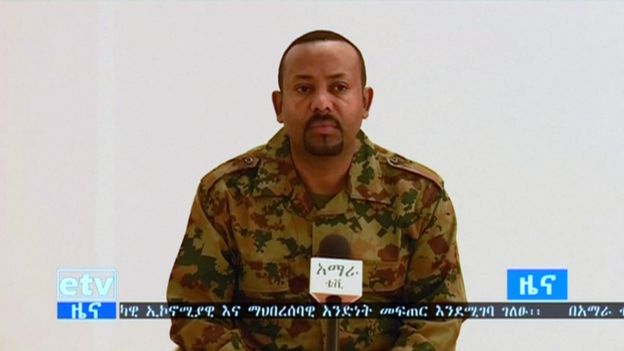BBC
The chief of staff of the Ethiopian army, Gen Seare Mekonnen, has been shot dead by his own bodyguard in the capital, Addis Ababa.
He and another officer died trying to prevent a coup attempt against the administration in Ethiopia’s northern Amhara region, PM Abiy Ahmed said.
In Amhara itself, regional governor Ambachew Mekonnen was killed along with an adviser.
The government says the situation is under control after arrests were made.
The prime minister has gone on TV to urge Ethiopians to unite in the face of “evil” forces set on dividing the country.
The US state department has warned its staff in Addis Ababa to stay inside.
Ethnic violence has hit Amhara and other parts of Ethiopia in recent years.
Since his election last year, Mr Abiy has moved to end political repression by releasing political prisoners, removing bans on political parties and prosecuting officials accused of human rights abuses.
Africa’s oldest independent country, Ethiopia is also the continent’s second most populous (after Nigeria), with 102.5 million inhabitants from more than 80 different ethnic groups.
A transfer hub for long-haul air travel, it has one of the fastest-growing economies in the world, but a vast number of young Ethiopians are without work.
What do we know about the attacks?
Gen Seare was killed on Saturday evening at his residence along with another general, Gezai Abera, by the bodyguard who is now in custody, the prime minister’s press office says.
 Image copyrightETHIOPIAN TV
Image copyrightETHIOPIAN TVThe government says it has reason to think the attack was linked to the assassination of the governor of Amhara a few hours earlier in the region’s capital, Bahir Dar.
Mr Ambachew was killed at a meeting in his office along with his senior adviser, Ezez Wasie, while the region’s attorney general was wounded.
Lake Ayalew has now been appointed as the region’s acting governor.
The prime minister’s office accused Amhara’s regional security chief, Brig-Gen Asaminew Tsige, of plotting the coup attempt. It is unclear whether he has been arrested.
 Image copyrightREUTERS
Image copyrightREUTERSMany of those involved in the coup attempt are under arrest and operations are in progress to detain others, the PM’s press office said.
“The coup attempt in Amhara regional state is against the constitution and is intended to scupper the hard-won peace of the region,” it added.
“This illegal attempt should be condemned by all Ethiopians and the federal government has full capacity to overpower this armed group.”
The mayor of Addis Ababa, Takele Uma, has said life will resume as normal on Monday and he called on the city’s public employees to go to work as usual.
Safety and security would be maintained in the capital, he promised.

A toxic political atmosphere
By Emmanuel Igunza, BBC Africa, Nairobi
These are tumultuous time for Ethiopia and Prime Minister Abiy, who is already facing increased ethnic tensions.
Chief of staff Seare Mekonnen had only served as head of the military for a year having being appointed by Mr Abiy, who made sweeping changes in the security apparatus when he took office last April.
It is clear there is still significant opposition within the military opposed to the PM’s style of leadership.
The killing of Amhara’s governor is also a big blow for Mr Abiy, who is credited with installing Ambachew Mekonnen in office.
He was a key ally in Amhara, which is itself facing security problems and clamour from some groups for greater autonomy from the central government.
The first general election since Mr Abiy came to power is supposed to be held next year, but it is very hard to see how this will go ahead in a country that is highly polarised. The atmosphere is just too toxic.
Why is Amhara so important?
The homeland of the Amhara ethnic group is the country’s second most populous region and has given Ethiopia its state language, Amharic.
Violence between the Amhara and Gumuz ethnic groups left dozens of people dead last month in Amhara and its neighbouring region, Benishangul Gumuz.
But his government has been battling growing violence and mounting pressure from regional strongmen, including in Amhara, a flash point in increasing ethnic clashes in Ethiopia.
In June 2018, an attacker dressed in a police uniform hurled a grenade at a huge rally attended by Mr. Abiy, causing a deadly explosion. Nine police officials were arrested after the attack, state media reported.
In October that year, rebellious Ethiopian soldiers seeking pay raises caused a security incident in the capital. Mr. Abiy later said that some of the soldiers who had entered the grounds of his office to confront him over the issue wanted to kill him.
He defused the situation by ordering them to do push-ups and joining in.
The latest killings come as the country gears up for a national parliamentary election next year. Several opposition groups have called for the polls to be held on time despite the unrest and displacement.
Ethiopians in many parts of the country reported a disruption in internet service beginning late Saturday, although the government has not stated whether it had again cut it off. The authorities have cut off the internet several times in the past for security and other reasons.
Amhara is home to Ethiopia’s second-largest ethnic group of the same name, and their native tongue, Amharic, is also the country’s official language. The antigovernment protests that lasted three years and eventually forced Prime Minister Hailemariam Desalegn to resign in 2018 had begun in the neighboring state of Oromia, but quickly spread to Amhara.
Demonstrators were angered by grievances over land rights, political and economic marginalization — issues that Mr. Abiy is now racing to address.
